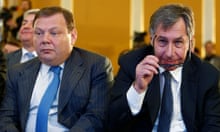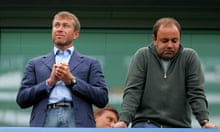The head of the Kremlin’s security council has threatened the “population of Lithuania” in an escalation of the row over Lithuanian railway’s refusal to allow some goods to cross to the Russian exclave of Kaliningrad.
After a meeting in the region, which is wedged between Lithuania and Poland, 800 miles from Moscow, Nikolai Patrushev, a close ally to Vladimir Putin, upped the rhetoric by threatening “serious consequences”.
“Russia will certainly respond to such hostile actions,” Patrushev said. “Appropriate measures … will be taken in the near future … Their consequences will have a serious negative impact on the population of Lithuania.”
Patrushev did not specify how Russia would retaliate, merely saying it would be “interagency”. Lithuania has already blocked Russian energy imports, leaving few other options for the Kremlin.
At the weekend, Lithuanian state railway had told Russian clients it could no longer transport steel or iron ore across EU territory to Kaliningrad, on the Baltic sea.
Goods banned from entering the EU under sanctions introduced after Putin’s invasion of Ukraine include Russian coal, metals, construction materials and advanced technology. Just less than half of the goods that cross Lithuania in about 100 train journeys every month fall under EU sanctions, although there are different dates for them coming into force.

A ban on oil will not be enforced until December as part of a compromise among the 27 EU member states.
The railways announcement prompted some panic shopping in Kaliningrad and an angry response from Moscow, where officials accused Lithuania of breaching transit agreements struck in 2004.
The European Commission has said Lithuania was acting legally, although the EU’s head of foreign policy, Josep Borrell, said on Monday that he would “double-check”, in what appeared to be an attempt to take the sting out of the row.
Patrushev had been speaking after a meeting in Kaliningrad, while earlier on Tuesday Russia’s foreign ministry summoned the EU ambassador to Moscow, Markus Ederer, over the “anti-Russian restrictions”.
“The inadmissibility of such actions, which violate the relevant legal and political obligations of the European Union and lead to an escalation of tensions, was pointed out,” the ministry said in a statement.
Speaking shortly after the meeting, Ederer said he had called on the Russian government to “remain calm” and “resolve this issue diplomatically”, the Russian news agency Tass reported.
Kaliningrad, which has a population of about 500,000, is the headquarters for Russian’s Baltic fleet and hosts some of its most powerful armaments, including hypersonic missiles. It was captured from Nazi Germany by the Red Army in April 1945 and ceded to the Soviet Union at the end of the war.
The region is strategically important to Russia. Nato has long identified a 50-mile strip of Polish and Lithuanian borderland, known as the Suwalki Gap, that lies between Russian Kaliningrad in the west and Kremlin-friendly Belarus to the east as a possible Putin target in the event of conflict.
Such a move could cut off Lithuania and Latvia in the north from the rest of the EU.








